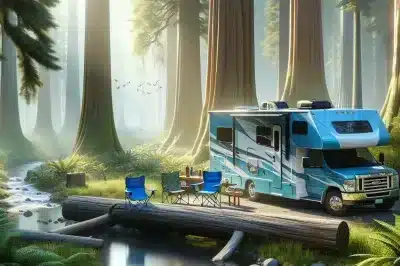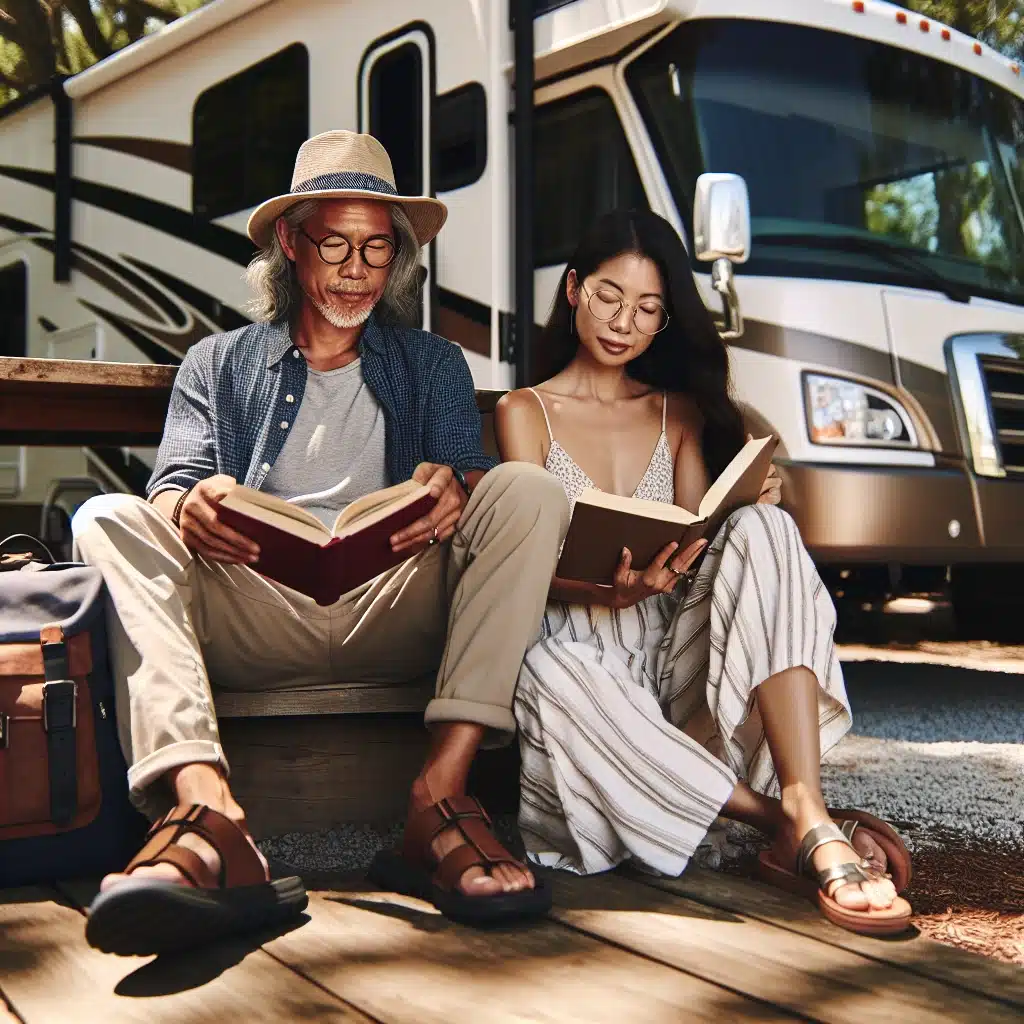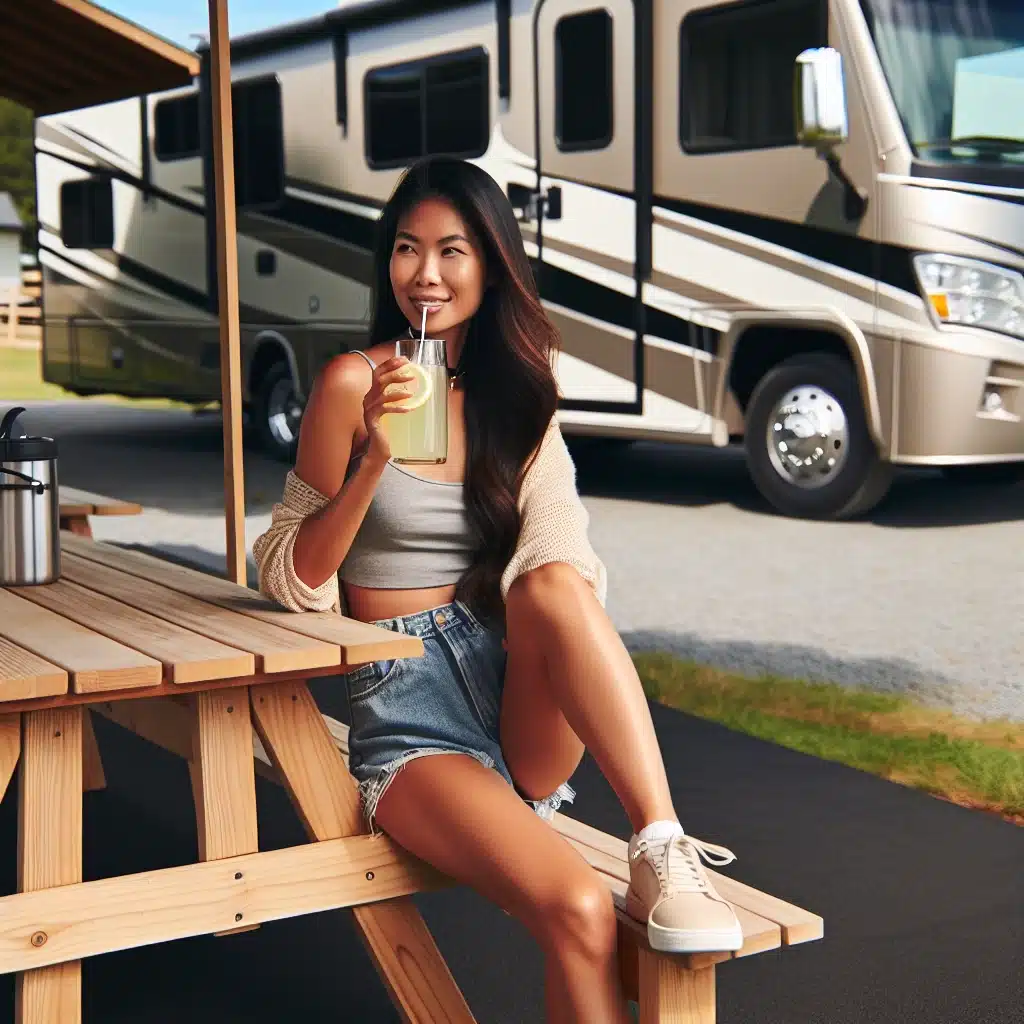Table of Contents

Boondocking RV Living: Generating Sufficient Electricity
Imagine waking up to the soft chirping of birds, a gentle breeze, and the warm kiss of the sun on your face. This is the essence of boondocking, where your RV becomes a vessel for freedom and adventure. But with no electrical hookups in sight, how do you keep the lights on and your essentials running? That’s where solar power comes into play, transforming the sun’s rays into a reliable energy source for your RV living.
Powering Your RV Off-the-Grid
Off-grid living doesn’t mean giving up the comforts of home. It’s about being smart with your energy use and harnessing the power of nature. Solar power is the key to unlocking the full potential of boondocking. With the right setup, you can generate enough electricity to power everything from your refrigerator to your laptop, all without a campground plug in sight.
Understanding Boondocking Basics
Boondocking, or dry camping, is the practice of parking your RV in a place without the usual amenities like water, sewer, or electrical connections. It’s the ultimate expression of RV freedom, allowing you to explore and stay in untouched environments. But to do it right, you need to be prepared, especially when it comes to power.
What is Boondocking and Why You Should Try It
Boondocking is not just a way to camp; it’s a lifestyle choice that brings you closer to nature and teaches you to be self-sufficient. It’s for those who want to disconnect from the grid and find peace away from crowded campgrounds. The serenity and solitude it offers are unmatched, and the best part? It’s often completely free.
The Essentials of Off-Grid RVing
To successfully live off-grid in your RV, you need to understand your power needs and how to meet them sustainably. This means knowing how much power your appliances use, how to conserve energy, and most importantly, how to generate your own electricity. Solar power is a popular choice for boondockers due to its reliability and low environmental impact.

Starting with the Sun: Solar Power Solutions
The sun is your most reliable ally when living off-grid. Solar power solutions for RVs have come a long way, offering you the freedom to explore without sacrificing comfort. By harnessing solar energy, you can keep your batteries charged and your devices powered up, all while doing your part for the planet.
Solar Panels: Core Component for Sustainable Energy
At the heart of any solar power system are the solar panels. They are the workhorses, silently converting sunlight into electricity. Choosing the right panels for your RV is crucial. You want panels that are efficient, durable, and suitable for the space you have available. Monocrystalline panels are a popular choice because they’re effective even on cloudy days and take up less space than other types.
Charge Controllers: Regulating Your Solar Input
A charge controller is like a traffic cop for your solar power system. It directs the flow of electricity from your solar panels to your battery bank, ensuring that the batteries charge properly and aren’t overcharged, which can reduce their lifespan. A good charge controller is an investment in the health and efficiency of your off-grid power system.
Battery Banks: Storing Your Solar Power
Your battery bank is your energy reservoir. It stores the electricity generated by your solar panels for use when the sun isn’t shining. Deep cycle batteries are the go-to for many RVers due to their ability to be discharged and recharged many times. The capacity of your battery bank should match your energy needs, ensuring you have enough power to last through the night or a stretch of bad weather.
Alternative Power Generators for Back-Up
Even with a robust solar power system, it’s wise to have a backup plan. Generators can provide that peace of mind. They’re especially useful in extended periods of overcast weather or when your energy needs exceed what your solar setup can provide. It’s all about having options and ensuring you’re never left in the dark.
Pros and Cons of Portable Generators
Portable generators are a common backup power source for boondockers. They’re relatively inexpensive and can produce a lot of power quickly. However, they also come with downsides such as noise, fumes, and the ongoing cost of fuel. They’re a good option for occasional use, but they’re not as sustainable or quiet as solar power.
Fuel Efficiency and Environmental Considerations
When using generators, fuel efficiency is key. You want a generator that gets the most power out of every gallon of fuel. This not only saves you money but also reduces your environmental footprint. It’s important to balance your need for power with your desire to preserve the beautiful natural settings you’re exploring.

Wind Energy: A Boondocker’s Friend or Foe?
Wind energy is an intriguing option for those looking to extend their energy sources beyond solar. While it’s not as common as solar power in the boondocking community, wind power can be a viable supplement, particularly in areas with consistent winds. But is it the right choice for your RV lifestyle?
Feasibility of Wind Power for RVs
Wind turbines for RVs are more than a novel idea; they’re a practical solution for generating electricity in windy locales. However, they’re not for everyone. The feasibility of wind power hinges on your typical travel destinations and how often you encounter windy conditions. If you find yourself frequently in coastal areas or open plains, a small wind turbine could boost your energy independence.
Installation and Maintenance of Wind Turbines
Installing a wind turbine on your RV is a commitment. It requires careful consideration of the weight, mounting location, and potential for vibration. Maintenance is also a factor; turbines have moving parts that can wear out and need replacing. While they can offer significant power, the initial setup and upkeep might be more than some are willing to tackle.
Balancing Power Needs with Consumption
Generating power is just one side of the coin; the other is managing your consumption. Balancing your energy needs with your RV’s power production is crucial. This balance ensures you have enough power to meet your needs without overtaxing your system.
Energy Efficient Appliances and Practices
One of the best ways to balance your power is to invest in energy-efficient appliances and adopt energy-saving practices. LED lighting, energy-efficient refrigerators, and propane-powered stoves can drastically reduce your electricity usage. Additionally, simple habits like unplugging devices when not in use and maximizing natural light can make a big difference.
Monitoring Electric Usage: Tools and Tips
Keeping an eye on your electric usage doesn’t have to be a guessing game. Tools like energy monitors can track how much power you’re using and help identify areas where you can save. Knowing your daily consumption is empowering and allows you to adjust your habits to ensure your energy reserves last as long as you need them to.
Upgrading Your RV for Optimal Energy Use
Upgrading your RV for energy efficiency isn’t just about adding solar panels; it’s about creating a system that works seamlessly to meet your power needs. This means choosing the right components that will make your energy use as efficient as possible. Let’s look at how you can upgrade your RV to harness and use solar power effectively.
Selecting the Right Inverter for Your Needs
The inverter is a critical component in your solar power setup. It converts the DC electricity stored in your batteries into the AC power that most of your appliances use. Selecting the right inverter comes down to understanding your power consumption. You’ll want an inverter that can handle the peak load of all your appliances running at once, with a little extra headroom to be safe. A pure sine wave inverter is a great choice for running sensitive electronics without risk of damage.
LED Lighting and Low Power Gadgets
LED lighting is a game-changer for energy conservation in your RV. These lights use a fraction of the power traditional bulbs do, which means your batteries will last longer. But don’t stop there—opt for low power gadgets whenever possible. Think rechargeable fans, solar-powered lanterns, and energy-efficient laptops. Every watt saved is a watt that can be used elsewhere in your RV.
FAQs: Common Questions About RV Solar Power
As you dive into the world of RV solar power, questions are bound to arise. Here are answers to some of the most common queries that can help you navigate your solar journey with confidence.
How Much Solar Power Do I Need for My RV?
The amount of solar power you need depends on your energy usage. Start by calculating the total wattage of the appliances and devices you use daily. From there, consider how many hours of sunlight you can expect in the areas you travel to. A good rule of thumb is to have enough solar capacity to recharge your battery bank from 50% to full on a sunny day.
Can I Install Solar Panels Myself?
Yes, with some research and basic tools, you can install solar panels on your RV. It’s a project that requires careful planning and a bit of DIY spirit. Make sure to follow the manufacturer’s instructions and local regulations. If you’re not comfortable with the installation process, it’s always a good idea to hire a professional to ensure it’s done safely and correctly.
What is the Lifespan of Solar Power Systems?
Solar power systems are a long-term investment, and their components have impressive lifespans. Solar panels, for example, can last anywhere from 25 to 30 years, often with warranties to match. The longevity of your system also hinges on the quality of the components and proper maintenance. Charge controllers and inverters typically have shorter lifespans, ranging from 10 to 15 years, so you may need to replace them at least once during the life of your solar panels.
How Do I Maintain My Solar Power Setup?
Maintaining your solar power setup is simpler than you might think. The most important task is keeping your solar panels clean and free of debris, which can block sunlight and reduce efficiency. Regularly inspect your system’s wiring and connections for signs of wear or damage. Batteries also require attention; ensure they’re kept at the recommended charge level and check fluid levels if you’re using lead-acid batteries. A bit of care goes a long way in keeping your system running smoothly.
Key Takeaways
– Boondocking with solar power allows for sustainable, off-grid living in your RV.
– Understanding your power needs and how to meet them is crucial for successful off-grid RVing.
– Solar panels, charge controllers, and battery banks are the core components of a solar power system.
– Regular maintenance of your solar power setup ensures efficiency and longevity.
– Choosing the right batteries for storage is essential for a reliable solar power system.
As we wrap up our journey into the electrifying world of boondocking RV living, it’s clear that generating sufficient electricity through solar power is not just feasible but also deeply rewarding. It offers a blend of freedom, sustainability, and connection with nature that traditional RVing can’t match. Whether you’re a seasoned boondocker or just starting out, the sun is your ally, and with the right setup, you’ll have all the power you need to make your off-grid dreams a reality. Happy travels, and may the sun always shine on your adventures!
- Boondocking RVs: Flexible Solar Solutions – 3 March 2024
- Renewable Energy Tips for Full-Time Boondocking RVers – 2 March 2024
- Boondocking Solar Power Systems: Sizing Options & Solutions for Motorhomes – 1 March 2024
